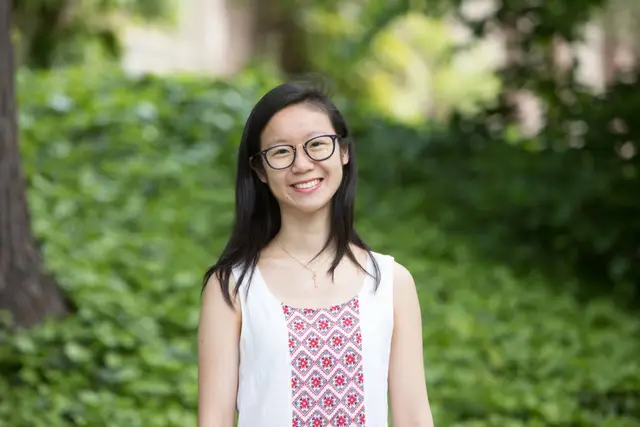Polygence mentor Chelsea helps young humanists thrive and make sense of the tumultuous world through writing
5 minute read
Chelsea is a Stanford PhD candidate in French who is deeply passionate about language learning and interdisciplinary humanistic inquiry, and whose broad experience has led her to a teaching philosophy based on trust and compassion. She is the perfect person to guide students through studying languages, expressing themselves creatively, or diving into academic humanities research. Chelsea believes that Polygence is a uniquely appealing experience for students fascinated by the humanities, as it can allow them to do writing and research guided wholly by their own interests, rather than topics imposed upon them.
Chelsea’s passion for languages began when she was studying French in high school and had the opportunity to spend a summer living with a French host family before college. “Expressing myself in French has been where I feel the most often “out of place” as a non-native speaker, but it is precisely that place just outside the comfort zone which has been consistently rewarding.” With her interest in French and Art History solidified by this summer abroad, Chelsea studied these two areas in her undergraduate years, and then went on to pursue a Master’s and now a PhD in French. Chelsea’s expertise in both literature -- which engages our linguistic capacities -- and art -- which engages our senses -- has led her research into the domain where these two overlap. Her Master’s thesis explored the sense of smell in Samuel Beckett’s novel <em>Molloy</em>.
Do your own research through Polygence!
Polygence pairs you with an expert mentor in your area of passion. Together, you work to create a high quality research project that is uniquely your own.
Chelsea sees Polygence as the perfect place to give young students the time and space to explore these eclectic domains within the humanities, which are generally not available to students in the typical high school classroom. “The humanities only progress when we’re ready and able to enter into prolonged dialogue with others who have a stake in the same conversation. School is a good place to learn information and try our hand at pushing forward ideas, but a program like Polygence demands that we put our individuality into the humanities and spend time chewing over a range of ideas - from the silly to the stoic - in order to make a sustained effort into a productive exploration.”
Humanities research is unique in that it can veer in unexpected directions, necessarily guided by what genuinely moves and fascinates us. For this reason, Chelsea has frequently adapted her Polygence teaching to engage with the current events weighing on her students, taking them through writing exercises or dialogues to process their thoughts and feelings. “Sometimes we talk about where language fails us, other times we talk about how powerful and important it is to wield the pen in the face of silence or suffering. I’ve had students want to write about their experience during the COVID-19 crisis and their reaction to the social justice movements taking place around the globe. Writing is a critical skill to develop in order to express complex moments such as the ones we are living now.”
Do your own research through Polygence!
Polygence pairs you with an expert mentor in your area of passion. Together, you work to create a high quality research project that is uniquely your own.
To engage in these vulnerable conversations, Chelsea cultivates a bond of trust between her and her student, and always attunes herself to her students’ needs and mindset on any given day. “All of my sessions begin with simple check-ins: “How are you today?” Sometimes students need to get things off their chest about school or, more often these days, their boredom being cooped up at home. These short conversations are where I gauge what students need that day in our session.”
Chelsea has many years of experience teaching both French and English at the college level, but her Polygence mentoring experience has been like no other, precisely because she gets to adapt her teaching to the individual student. “Polygence has been extremely rewarding because I thrive (as well as we all do I think!) when learning is personalized, and I see Polygence students getting exactly that kind of experience. Carefully shaping each course and session to the individual needs of the student means students get to achieve their goals in a streamlined way.” Moreover, Polygence’s online format has engaged Chelsea’s passion for diverse perspectives and multiculturalism, by allowing her to get to know students from a variety of locations and backgrounds. “The cross-pollination of cultural experience and background is a key part of my teaching philosophy that I am grateful to have experienced through Polygence.”
Your Project Your Schedule - Your Admissions Edge!
Register to get paired with one of our expert mentors and to get started on exploring your passions today! And give yourself the edge you need to move forward!
Chelsea hopes that Polygence students will take the program as an opportunity to pursue their most genuine passions, no matter what those may be. “If you know what you’re interested in, don’t second guess your choice! You will find greater accomplishments in the places that get you excited to learn.” She sees the Polygence experience as removing many of the barriers that prevent students from really enjoying themselves in a typical classroom. “You should feel liberated by the fact that this 1) is not school and not about proving you’re “smart” and 2) it is a fantastic place to dive deep into subjects that you’d have to wait later in your academic career to dive into otherwise.”
Want to Learn More?
Join Polygence and do your own research project tailored towards your passions and guided by one of our expert mentors!
